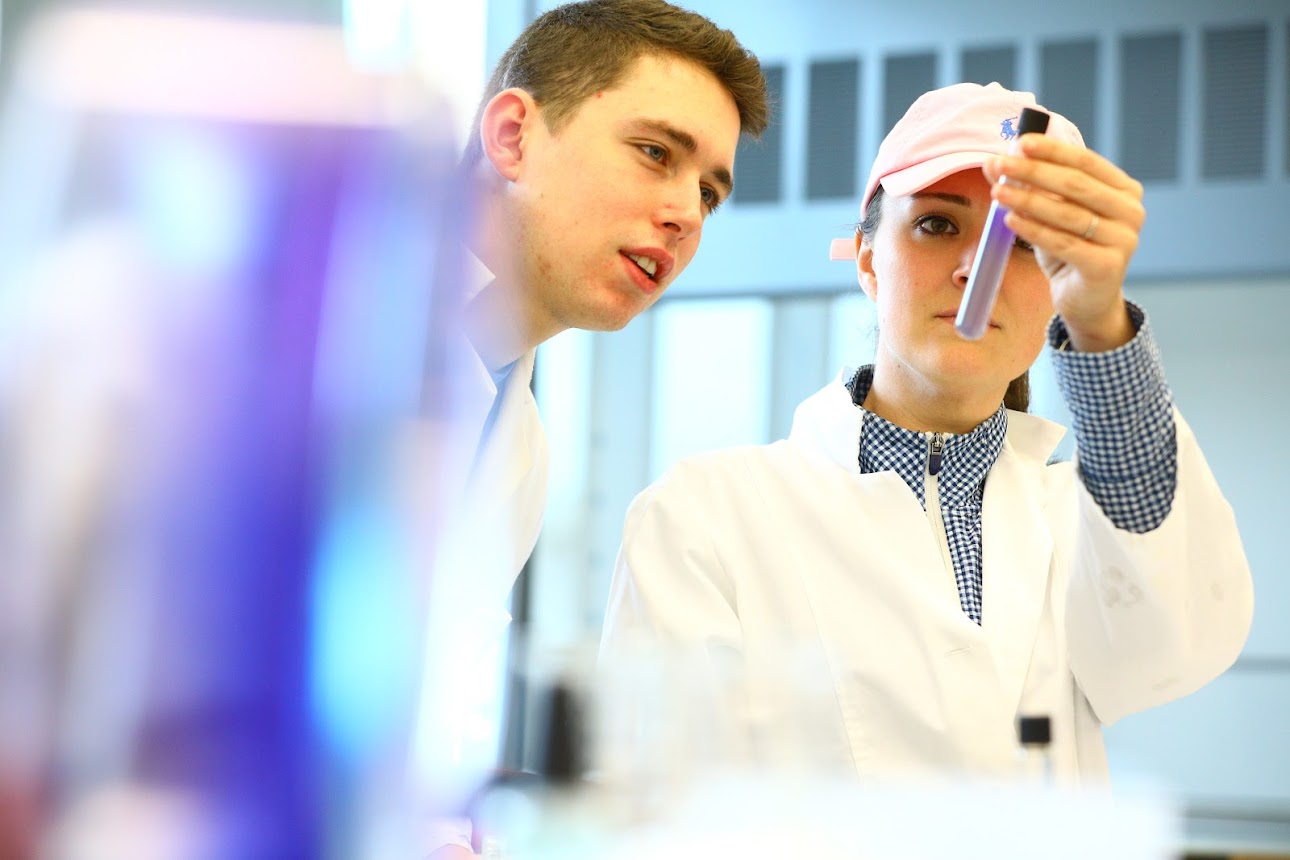Program Details
 CHEMISTRY MAJOR PROGRAM
CHEMISTRY MAJOR PROGRAM
Students graduating with a major in chemistry will be able to:
- Demonstrate knowledge of basic principles and theories in analytical, organic, physical chemistry, inorganic, and biochemistry
- Apply chemical principles through problem solving and laboratory experimentation
- Demonstrate competency in use of various laboratory Instruments
Major requirements:
-
BIOL 150 Introduction to Biology I: Cells (4 cr)
-
BIOL 360 Biochemistry (3 cr)
-
CHEM 150 Introduction to Chemistry I (4 cr)
-
CHEM 152 Introduction to Chemistry II (4 cr)
-
CHEM 201 Organic Chemistry I (4 cr)
-
CHEM 202 Organic Chemistry II (4 cr)
-
CHEM 250 Inorganic Chemistry (3 cr)
-
CHEM 301 Physical Chemistry I (3 cr)
-
CHEM 302 Physical Chemistry II (3 cr)
-
CHEM 310 Analytical Chemistry (4 cr)
- CHEM 311 Instrumental Analysis in Chemistry (4 cr)
-
CHEM 401 Advanced Laboratory (3 cr)
- CHEM 490 Chemistry Seminar (1 cr)
-
MATH 150 Precalculus (3 cr)
-
MATH 220 Calculus I (3 cr)
-
MATH 320 Calculus II (3 cr)
-
PHYS 151 Introduction to Mechanics (4 cr)
-
PHYS 251 Introduction to Electricity & Magnetism (4 cr)
TOTAL CHEMISTRY MAJOR REQUIREMENTS 61 cr
1 Optional if student places into MATH 220.
MINOR PROGRAM
Students graduating with a minor in Chemistry will be able to:
- Demonstrate knowledge of basic principles and theories in analytical, organic and one of the following sub areas: inorganic, biochemistry or physical chemistry
- Apply chemical principles through problem solving and laboratory experimentation
- Demonstrate competency in use of basic laboratory
Minor requirements:
- CHEM 150 Introduction to Chemistry I (4 cr)
- CHEM 152 Introduction to Chemistry II (4 cr)
- CHEM 201 Organic Chemistry I (4 cr)
- CHEM 202 Organic Chemistry II (4 cr)
- CHEM 310 Analytical Chemistry (4 cr)
Select one upper level chemistry elective (excluding seminars and core curriculum
courses) 3cr
TOTAL CHEMISTRY MINOR REQUIREMENTS 23 cr
CONCENTRATION IN BIOCHEMISTRY
Students graduating with a major in Chemistry will be able to:
- Demonstrate knowledge of basic principles and theories in analytical, organic, physical chemistry, inorganic, and biochemistry
- Apply chemical principles through problem solving and laboratory experimentation
- Demonstrate competency in use of sophisticated laboratory instruments3
- Students with a Concentration in Biochemistry will also design, implement, and analyze biochemical experiments involving nucleic acids and proteins
Biochem requirements:
-
BIOL 150 Introduction to Biology I: Cells (4 cr)
-
BIOL 360 Biochemistry (3 cr)
-
BIOL 361 Advanced Biochemistry 3 or BIOL 361H Honors: Advanced Biochemistry
-
BIOL 410 Biotechniques (4 cr)
-
CHEM 150 Introduction to Chemistry I (4 cr)
-
CHEM 152 Introduction to Chemistry II (4 cr)
-
CHEM 201 Organic Chemistry I (4 cr)
-
CHEM 202 Organic Chemistry II (4 cr)
-
CHEM 250 Inorganic Chemistry (3 cr)
-
CHEM 301 Physical Chemistry I (3 cr)
-
CHEM 310 Analytical Chemistry (4 cr)
- CHEM 311 Instrumental Analysis in Chemistry (4cr)
-
CHEM 490 Chemistry Seminar (1 cr)
-
MATH 150 Precalculus ¹(3 cr)
-
MATH 220 Calculus I (3 cr)
-
MATH 320 Calculus II (3 cr)
-
PHYS 151 Introduction to Mechanics (4 cr)
-
PHYS 251 Introduction to Electricity & Magnetism (4 cr)
Total Credits: 62
1 Optional if student places into MATH 220.
TOTAL CONCENTRATION BIOCHEMISTRY REQUIREMENTS 62 cr
Formulation Chemistry Concentration
The Formulation Chemistry concentration prepares students for immediate jobs in manufacturing and quality control in biotech, pharmaceutical, industry, and cosmetic companies.
Students graduating with a Formulation Chemistry Concentration will be able to:
- Demonstrate knowledge of basic principles and theories in biology, analytical, organic, inorganic chemistry and biochemistry
- Apply chemical and biological principles through problem solving and laboratory experimentation
- Demonstrate competency in use of sophisticated laboratory instruments
- Generate, record and process experimental data and present that data in a variety of methods.
Formulation requirements:
- BIOL 150 Introduction to Biology I: Cells (4 cr)
- BIOL 240 Genetics (4 cr)
- BIOL 320 Microbiology (4 cr)
- BIOL 360 Biochemistry (3 cr)
- CHEM 150 Introduction to Chemistry I (4 cr)
- CHEM 152 Introduction to Chemistry II (4 cr)
- CHEM 201 Organic Chemistry I (4 cr)
- CHEM 202 Organic Chemistry II (4 cr)
- CHEM 250 Inorganic Chemistry (3 cr)
- CHEM 310 Analytical Chemistry (4 cr)
- CHEM 311 Instrumental Analysis in Chemistry (4 cr)
- CHEM 401 Advanced Laboratory (3cr)
- CHEM 490 Chemistry Seminar (1 cr)
- COMM 309 Technical Writing (3 cr)
- MATH 150 Precalculus (3 cr)
- MATH 220 Calculus I (3 cr)
- MATH 232 Introduction to Statistics (3 cr)
- PHYS 131 General Physics I (4 cr)
- PHYS 132 General Physics II (4 cr)
Total Hours 66
If you have any questions, please contact Dr. Rob Harris, Chemistry Department Chair. robert.harris@mcla.edu or 413-662-5451.
